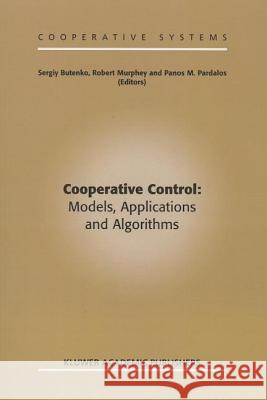Cooperative Control: Models, Applications and Algorithms » książka
Cooperative Control: Models, Applications and Algorithms
ISBN-13: 9781441952417 / Angielski / Miękka / 2010 / 364 str.
A cooperative system is a collection of dynamical objects, which communicate and cooperate in order to achieve a common or shared objective. The cooperation of entities is achieved through communication; either explicitly by message passing, or implicitly via observation of another entities' state. As in natural systems, cooperation may assume a hierarchical form and the control processes may be distributed or decentralized. Due to the dynamic nature of individuals and the interaction between them, the problems associated with cooperative systems typically involve many uncertainties. Moreover, in many cases cooperative systems are required to operate in a noisy or hazardous environment, which creates special challenges for designing the control process. During the last decades, considerable progress has been observed in all aspects regarding the study of cooperative systems including modeling of cooperative systems, resource allocation, discrete event driven dynamical control, continuous and hybrid dynamical control, and theory of the interaction of information, control, and hierarchy. Solution methods have been proposed using control and optimization approaches, emergent rule based techniques, game theoretic and team theoretic approaches. Measures of performance have been suggested that include the effects of hierarchies and information structures on solutions, performance bounds, concepts of convergence and stability, and problem complexity. These and other topics were discusses at the Second Annual Conference on Cooperative Control and Optimization in Gainesville, Florida. Refereed papers written by selected conference participants from the conference are gathered in this volume, which presents problem models, theoretical results, and algorithms for various aspects of cooperative control. Audience: The book is addressed to faculty, graduate students, and researchers in optimization and control, computer sciences and engineering.











